Can Rabbits Eat Watermelon?
This page contains affiliate links. We may earn money or products from the companies mentioned in this post through our independently chosen links, which earn us a commission. Learn More
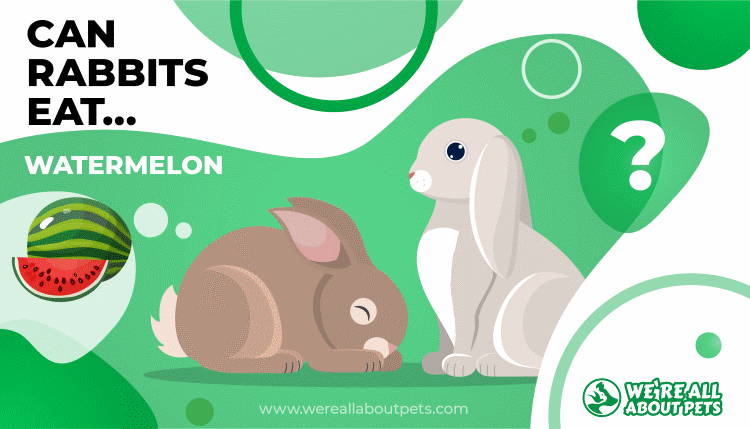
Sweet and juicy, it’s summertime wrapped in a bright green rind!
Most people love watermelon – in fact, it’s one of our favorites. But what about bunnies? Can rabbits have watermelon?
Is watermelon safe for rabbits to eat, or is it one of those things that’s better left off your fuzzy friend’s menu? The good news is that rabbits can eat watermelon.
The bad news (from your bunny’s point of view, anyway) is that there’s a limit to how much watermelon a rabbit can eat without suffering from side effects. Before you hop off to fetch your bunny a refreshing slice of melon, there are a few more things you should know.
Keep reading for all the facts on watermelon for rabbits.
Quick Navigation
Watermelon Nutrition Stats
Loaded with antioxidants and touted for its heart-healthy benefits, watermelon is the perfect summertime treat. Its high water content means you get plenty of satisfaction without consuming tons of calories, and that means it’s a great treat for your rabbit (and for you!)
A one-cup serving of watermelon contains approximately:
- 47 calories
- 5 g carbohydrates
- .6 g fiber
- 1 g protein
- .2 g fat
Watermelon Nutritional Facts

Although it’s relatively low in calories, watermelon offers loads of vitamin C – about 21 percent of the US daily recommended value!
A refreshing, juicy one-cup serving of watermelon offers:
- 865 iu vitamin A
- 170 mg potassium
- 3 mg vitamin C
- .1 mg vitamin B6
- .1 mg manganese
- 2 mg magnesium
- .1 mg thiamine
- .3 mg pantothenic acid
- .1 mg copper
Can Rabbits Have Watermelon?
Yes! Rabbits can have watermelon as a treat – but not every day. Furthermore, it’s important to note that fruit (including watermelon) shouldn’t be a big part of your rabbit’s diet.
We don’t want to prevent you from treating your bunny to watermelon; after all, nothing is quite so adorable as a rabbit nibbling on a favorite food!
We do want to stress that watermelon makes a healthy natural treat for rabbits so long as you prepare it properly and offer it in the right amount.
Before you head for the farmer’s market to find the perfect watermelon to share with your pet bunny, there are a few more things we’d like to tell you about watermelon for rabbits.
Is Watermelon Good For Rabbits?
Yes! Watermelon can be very good for rabbits. In fact, it offers some great health benefits that apply specifically to rabbits:
- Good source of antioxidants to help your bunny stay healthy
- Offers a variety of vitamins and minerals
- Relatively high in potassium, which is essential in reducing your rabbit’s risk of developing kidney stones
How Much Watermelon Can A Rabbit Eat?
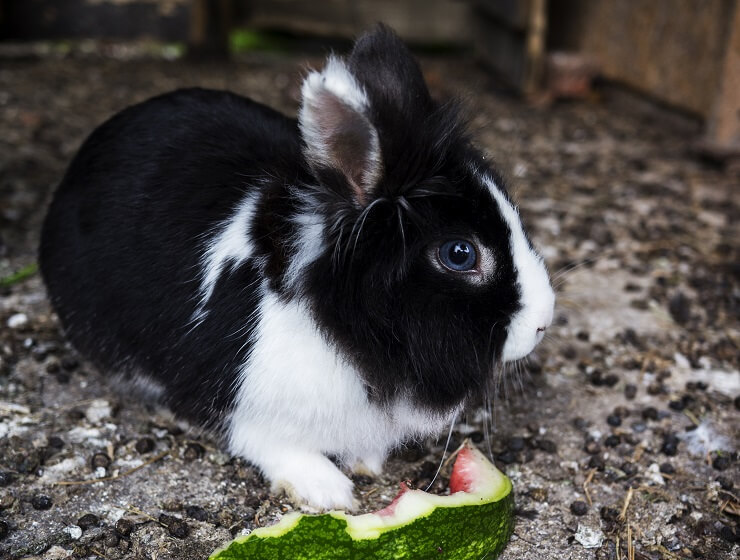
We’re willing to bet that just like us, you’re able to eat quite a bit of watermelon. Unfortunately, your bunny has to enjoy it in moderation.
Here’s how much watermelon to feed your rabbit:
| Age | Amount |
| Baby rabbits | None |
| Juvenile rabbits | None |
| Adult rabbits | 1 tablespoon per 2 pounds of body weight |
There are a couple of very important reasons to feed your rabbit watermelon in moderation. First, your rabbit’s digestive system is very sensitive and too much sugar can alter gut flora, leading to discomfort and causing digestive issues that can drag on for days.
Second, watermelon is very high in water. That’s not a huge problem since water is essential for rabbits, but too much at once can lead to diarrhea, which can be dangerous.
As with other new treats (even natural ones!) it’s important to feed a rabbit watermelon gradually. Start with a small amount – perhaps a teaspoon – and watch your rabbit for signs of trouble over the next 24 hours.
If your bunny is fine and you don’t notice any runny stool, feel free to increase the amount gradually until your rabbit is happily enjoying a full-size portion of watermelon.
How Often Can A Rabbit Eat Watermelon?
Your rabbit can eat watermelon two to three times per week, but not on the same day as you’re feeding other sugary or high-water snacks.
Of course, it’s best to offer a wide variety of treats – and to avoid feeding your rabbit sugary food on a daily basis. Rabbits who develop a sweet tooth tend to ignore their regular food and this can cause major problems for their digestive system.
The Correct Diet is Important
Speaking of proper diet, let’s take a quick look at what your rabbit should be eating every day. Just like wild rabbits, domesticated bunnies of all breeds need a highly specific diet based on high-fiber grasses.
After all, watermelon isn’t something you’d find rabbits eating in the wild!
- Unlimited amount of fresh, clean hay – 24/7 supply
- Unlimited amount of clean, fresh water – 24/7 supply
- Age-appropriate rabbit pellets (check the label since different brands recommend different serving sizes)
- Salad once daily, made with about 1 cup of green leafy veggies per 2 pounds of body weight and a few crunchy veggies for good measure
- Treats in moderation; always check for specific serving sizes and introduce new treats carefully
- A tablespoon or so of seeds – pumpkin seeds and sunflower seeds are favorites (no need to add these if they’re already blended into your rabbit’s food)
What Are Other Healthy Alternatives To Watermelon In A Rabbit’s Diet?
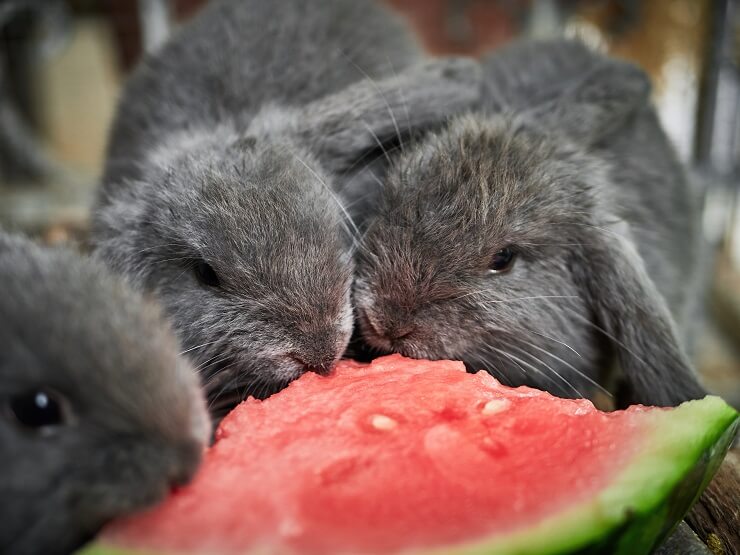
Since rabbits should eat watermelon in moderation, it’s natural to look for other treats! Great news: There are tons of vegetables that are good for rabbits and we’ve listed some of the most popular, easiest-to-find varieties here for your convenience.
Try feeding your bunny:
- parsley
- basil
- cilantro
- carrots
- carrot tops
- spinach
- arugula
- swiss chard
- beets
- beet greens
- radish tops
- romaine lettuce
- bibb lettuce
- butter lettuce
- cabbage
- red cabbage
- broccoli
- brussels sprouts
- endive
- dandelion greens
- escarole
- yu choy
- bok choy
- fennel
- bell peppers
- cucumbers
- kale
- celery
It’s a very good idea to rotate the treats you give your rabbit and offer different types of greens throughout the week.
This prevents a compound called oxalate from building up in the kidneys, which is something that can happen when feeding large amounts of the same greens every day.
Giving your rabbit watermelon is a great way to add vitamins, minerals, and interesting flavor to their diet – so long as it’s in moderation!
Frequently Asked Questions
Do rabbits like watermelon?
Yes! Rabbits love watermelon. It’s one of their favorite treats.
Is watermelon safe for rabbits?
Yes, it’s safe to feed rabbits watermelon, but you’ll want to remove any black seeds you find. These are sharp and difficult to digest. The small, soft white seeds are fine to leave in.
Can a rabbit have watermelon rind?
Even though rabbits teeth benefit from chewing tough foods and despite the fact that watermelon rind is fine for humans to consume, you shouldn’t give watermelon rind to rabbits unless you can find organic watermelon that hasn't been treated with chemicals. If overeaten, watermelon rind can cause serious digestive issues.
We know that many sources say it's OK to give watermelon rind to rabbits but unless you've got the organic kind and you cut it into small pieces, it’s best to stick with small amounts of sweet, juicy fruit from inside the watermelon. You can also offer small amounts of the white to pale green flesh from the interior of the watermelon, but the hard outer rind is best avoided if you've got conventionally grown watermelon.
So, you've got organic watermelon and you'd like to share the rind with your bunny?
Great! Wash the rind really well since it might still have traces of fertilizer on it, then give your rabbit about a 1-inch square. You can gradually increase the amount of watermelon rind you give your rabbit so long as it does not cause any digestive problems.
Can I give watermelon to a baby rabbit?
Baby bunnies have sensitive tummies – in fact, their digestive systems are far more sensitive than an adult rabbit’s. Unfortunately, it isn’t a good idea to give watermelon to baby rabbits. Only offer a baby rabbit hay, water, and age-appropriate food. For treats, tiny bits of romaine lettuce will have to do until your bunny finishes growing up.
Can watermelon make my rabbit sick?
Yes, but only if you make the mistake of feeding too much at once, or if you give them watermelon seeds or watermelon rind. So long as you introduce watermelon to your rabbit’s diet slowly and carefully, your bunny should be just fine. Remember to call your vet if you think your bunny has eaten anything that’s caused illness.






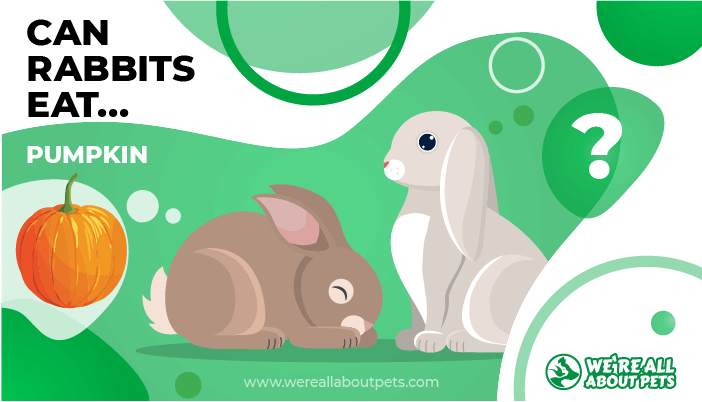
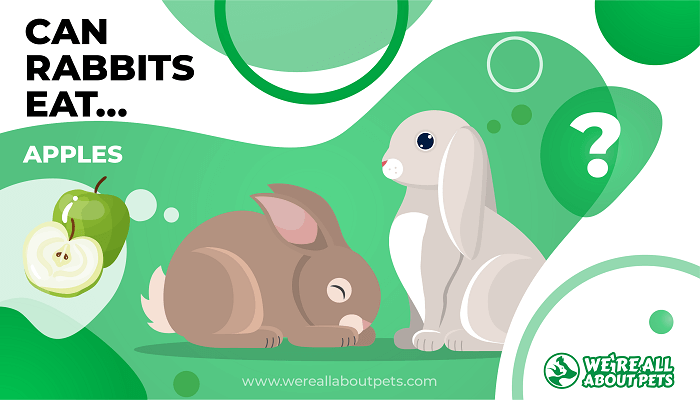
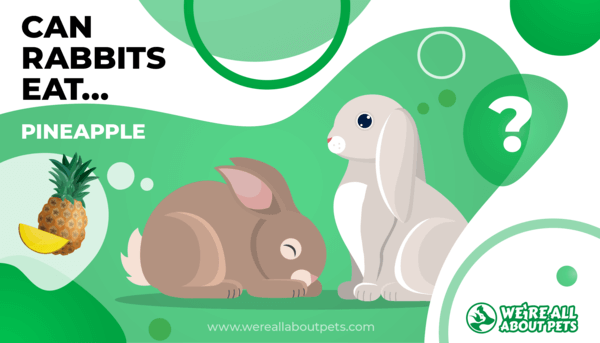
Ann
In looking online for what a rabbit can and can't eat is confusing because you see what rabbits can't eat on one website but on another website it's listed as ok for rabbits. I found one website that said watermelon rinds are ok for rabbits and then others say not.
Anne
Hi Ann! Thanks for your question. It's really confusing, I know - and in light of your question, I've updated our answer re: watermelon rinds for rabbits with some additional details that should make it a bit easier for other readers to make a well-informed decision. Let's take a deeper dive into the topic. This should help you (and anyone else who made it all the way to the comment section!) decide whether or not the watermelon rind you have is OK or not. Technically, other sources are right when they say rabbits CAN eat watermelon rinds but we like to err on the side of caution when giving recommendations. Here's why our quick answer is that rabbits shouldn't eat watermelon rinds: Most watermelon found in stores is conventionally grown, and has likely been treated with quite a few different chemicals that deter pests, prevent fungal growth on the fruit, and promote ripening. They're grown with fertilizer too - and even though this is applied to the soil and not to the plants themselves, watermelons (even organic ones) can be contaminated with traces of fertilizer. All of these chemicals remain on the watermelon's skin and sometimes they can penetrate a very short distance into the hard outer rind - meaning rinsing doesn't remove them. These chemicals do a great job of protecting crops but they aren't meant to be ingested. We never recommend feeding pets produce that we wouldn't eat ourselves, even when risks might be small or harm might be minor. Organic watermelons are hard to find in some places and they're normally more expensive than conventionally grown options, but if you can get your hands on some, then it's fine to share the rind with your bunny. Wash the rind really well because there could be traces of fertilizer on it. Only give your rabbit a tiny bit at first and like always, monitor them to make sure that the watermelon rind agrees with their system - watermelon rind can cause diarrhea and if you've had bunnies for a while, you know that this is a serious problem. Really err on the side of caution! If you're into canning and making preserves by the way, there are lots of recipes out there for things like watermelon rind pickles - and the rest of your organic watermelon rind is ideal for making these, so you aren't wasting anything. I've added a couple of links here that go over the herbicides, pesticides, fungicides, and fertilizers used in conventional watermelon production. Really, we don't think they're appropriate for anyone, especially furry little friends with sensitive systems! http://whatsonmyfood.org/food.jsp?food=WM https://secure.caes.uga.edu/extension/publications/files/pdf/B%20996_4.PDF